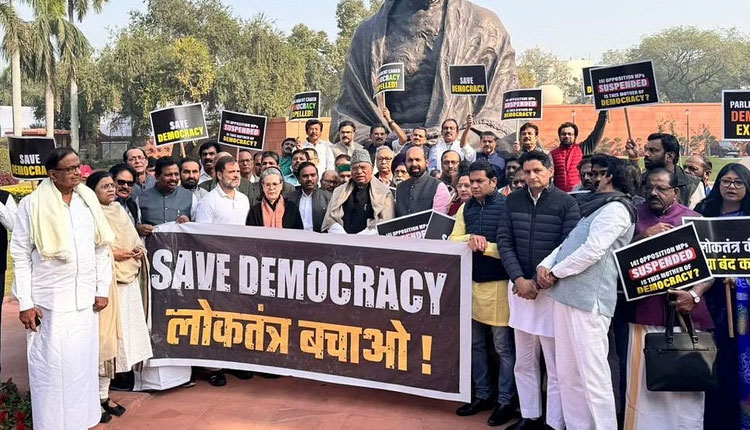New Delhi: In a significant development, the Lok Sabha Secretariat has taken stringent action against the suspended MPs, barring them from entering the lobby-gallery and chamber of Parliament. This latest move prevents the suspended MPs from physically accessing the Parliament House. As a result, a total of 141 MPs, including 95 from the Lok Sabha and 46 from the Rajya Sabha, are now prohibited from entering Parliament premises.
The suspension of MPs gained momentum this week when 49 MPs were suspended from the Lok Sabha on Tuesday, joining the 92 MPs suspended on Monday. The suspended MPs include prominent figures such as Farooq Abdullah, Supriya Sule, Shashi Tharoor, Dimple Yadav, and Jyotsna Mahant.
This unprecedented action marks the largest suspension of MPs in 34 years. In 1989, 63 MPs were suspended, highlighting the severity of the current situation. Congress leader Mallikarjun Kharge expressed concern, suggesting that the Modi government’s actions aim to silence the opposition and pass laws without proper discussion.
The suspension of MPs has sparked widespread protests outside Parliament, with opposition MPs demonstrating their dissatisfaction. Additionally, the lapses in Parliament security have come under scrutiny, leading to demands for a discussion on the issue.
Amidst the escalating tensions, Congress MP Adhir Ranjan Chowdhury expressed his concerns, stating that there is an atmosphere of anarchy in Parliament and a lack of trust in the parliamentary system. The incident involving TMC MP Kalyan Banerjee mimicking the Chairman of the Rajya Sabha, while Rahul Gandhi recorded the video, further fueled the controversy.
The ongoing situation underscores the challenges faced by Parliament in maintaining decorum and ensuring constructive debates. The suspension of MPs and the restrictions on their access to Parliament premises raise questions about the balance between upholding parliamentary rules and the right to dissent and expression.



Comments are closed.